
Dark Envoy Review
Dark Envoy is an indie-scale CRPG that caught my eye several years ago when it was originally announced in 2019. I never played the developer Event Horizon's previous game, Tower of Time, but with moderately good reception there, Dark Envoy seemed like an interesting follow-up, and I was curious to check it out. Although the game evidently went through several changes among many delays, now that it is about to finally see release, I had a chance to take a look.
At the beginning of Dark Envoy, unlike most RPGs in this space, the player creates two characters instead of just one. Malakai and Kaela are siblings - refugees during a seemingly endless war between factions colloquially known as 'The Empire' and 'The League'. The siblings are working as scavengers and treasure hunters, trying to build a life in a remote settlement away from the endless conflict engulfing the world of Jäan.
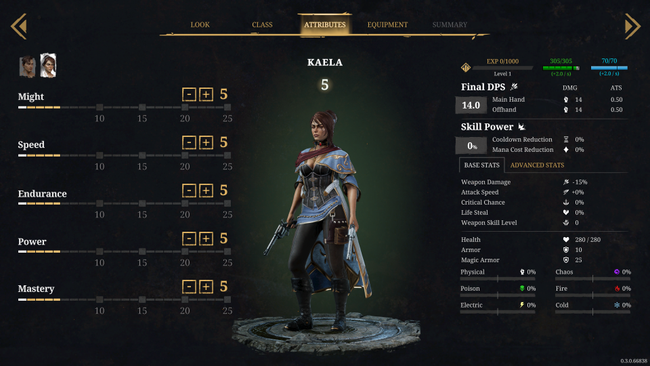
As I come to write this review for Dark Envoy, I felt that the strongest components of the game are found within its class & skill systems. So I feel it's appropriate to start with these in the review, considering this is also the first thing you'll encounter when you boot up a new playthrough.
There are four basic classes to choose from: Warrior, Ranger, Engineer, and the magical Adept. Each of these has three specializations that can be selected later on, so functionally there are 12 total class types you can use, and each of these has varying skill-set options as well. By the end of the game, you can even have multiple specializations.
Malakai and Kaela can be any class, so the level of flexibility in building these characters is quite vast, especially early on. I decided to have my Malakai be a tanky warrior-type unit, with Kaela outfitted to be a ranged DPS specialist. Starting out, you'll be stuck with only these two characters for a not-insignificant amount of time, so how you decide to build them could dramatically affect your approach to the game's opening hours. I imagine someone playing with Engineer Kaela and Adept Malakai could have a completely different experience than I did early on.
Six other characters join Malakai and Kaela during the course of the adventure, although it takes a bit of time before most of them actually make an appearance. These characters' classes are set in stone, so ideally, you would likely focus on the characters that complement your chosen builds for the siblings. Ultimately, you can use four characters in a party at a time, and luckily, all characters gain EXP evenly, so you are free to try out different party formations without worrying about EXP allocation.
Theory-crafting different party builds different class/unit combinations is easily the best component of Dark Envoy. To be succinct, I ultimately settled on a DPS melee, two DPS ranged, and a tank, but it's definitely possible to have quite a different set-up than I did and find success in the game. It's varied and satisfying when you construct a team that coordinates well, and it's worth noting you can respec skills at any time, so you are not penalized for being experimental.
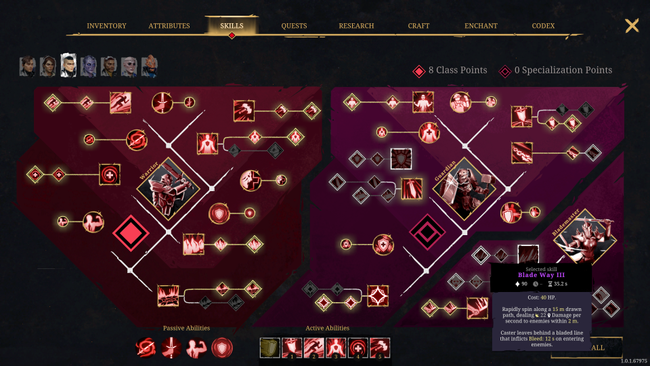
As far as combat goes, it works on a Real-Time-with-Pause (RTwP)-like system in a sort of mix between a traditional CRPG and something more akin to an RTS. As you might expect, the game uses an isometric viewpoint and a keyboard/mouse control scheme that are relatively commonplace in the subgenre. While the game supports controllers, I personally wouldn't ever consider the option for a game of this style.
In fact, Dark Envoy's combat structure most readily reminds me of a game that was released last year for a different publisher/developer entirely, The Diofield Chronicle, only with longer maps and many more enemies. You have four characters you control in real-time, all with a handful of abilities. You can either slow down time or pause it outright, lining up movements & actions, and coordinating your party to take on waves of oncoming foes. If you've played Diofield, this should sound familiar.
However, here is where I begin to run into what I consider my biggest annoyance with Dark Envoy. Going into the game, I wasn't expecting its encounter design to largely comprise wave after wave of Zerg Rushing enemies.
What effectively happens is this: You control your party as you move them across the explorable zone until you run into an enemy group. You'll initiate combat with the enemies, as they start slinging abilities while you start slinging abilities. The game is not turn-based, so this happens all at once.
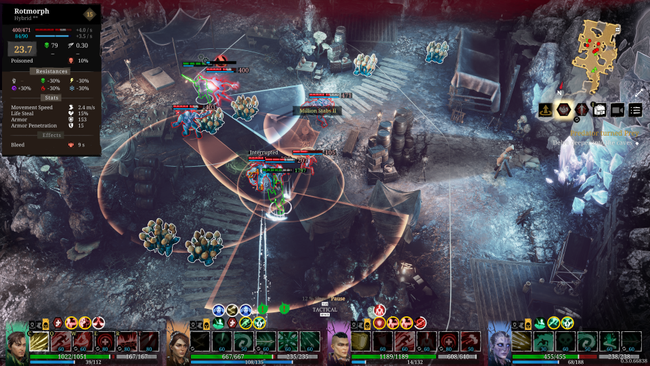
That's not really the annoying part, however. As you work to defeat foes, three or four more waves of reinforcements will magically begin to appear mid-combat at various warp points around the battlefield. These reinforcements keep appearing over and over as you start/stop/pause and navigate through the hectic combat zone. It's very easy to find yourself surrounded by foes, because there are only four of you and dozens upon dozens of magically appearing enemies. For me, it quickly became tedious, and every encounter felt like it went on for about 50% too long. I would have much preferred a smaller number of more interesting opponents, rather than the wave and wave of mooks you have to mow down to move along the map.
While there are various AI behaviors you can set on your units that will determine how they act on their own volition, no matter what the setting was, I found myself mostly just playing the part of some sort of annoyed chaperone as I repeatedly paused to micromanage my team in moving them away from danger. "Hey Kaela, don't just stand there in the AoE field while the enemy is launching an attack", I would hypothetically berate. AoE skill markers are everywhere, and at a glance, the visual noise on the screen can easily look like a mess. As I said, I often found myself repeatedly moving my characters away from danger since they seem to have little sense of self-preservation on their own. In fact, that's most of the game as far as combat goes, making sure your characters move out of the way.
Although I enjoyed trying out different classes and abilities, actually managing my team during combat was never really entertaining, and combat felt like it took forever. I think my experience with Dark Envoy actually makes me appreciate Diofield's bite-sized combat scenarios more so in hindsight. Even other classic CRPGs like Baldur's Gate don't have combat that drags on the way Dark Envoy's does.
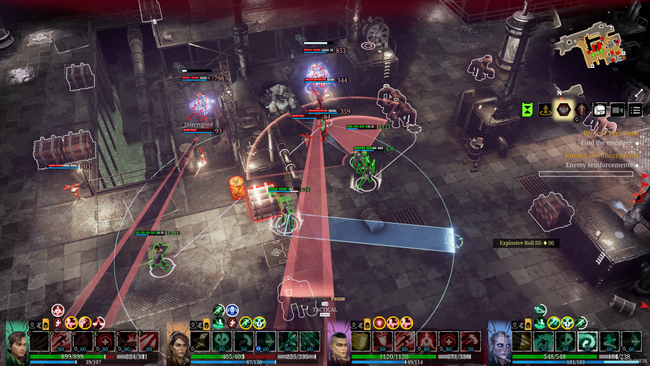
Unfortunately, Dark Envoy's characters and narrative never really warmed up to me either. The bond between Malakai and Kaela is mildly good; I've always had an affinity for sibling relationships between characters of that type. But the rest of the cast falls flat, and I cared more about their battle capabilities rather than anything else about them as a character or their role in the narrative. Being a small-scale project, I can't criticize the presentation too harshly, but awkward cinematic cutscenes and stilted character model animations don't help at all.
The pacing is a little weird too. You'll spend the first half or so of the game doing introductory exposition and tutorial quests. A significant chunk of the middle of the game feels mostly like hollow fetch quests which don't effectively move the plot along, nor work with any sort of interesting thematic concepts, nor establish any kind of interesting character dynamics. Even the dedicated companion quests for the other party members didn't leave any impression on me.
The game's ultimate conflict and antagonist come into focus at roughly 85% percent of the way through the game. So it feels as soon as Dark Envoy stops spinning its wheels and you begin the realize what the game's plot is actually about, and why there is a war to begin with, suddenly you hit the credits. Ultimately I struggle to say I latched onto anything here, except some sibling moments between Malakai and Kaela. There are story choices you make at points throughout the game that do seemingly affect other quests as well as the game's ending, but I can't pretend to say I cared much for any of them.
My playthrough was often significantly hampered by performance issues, too. I played an early PC copy of Dark Envoy and while I acknowledge PC performance may be improved by release (my early build even has a written disclaimer that it "does not represent the final quality of the game"), my experience was dreadful at times. The game worked fine starting out, but things seemed to worsen over time. Opening the inventory menu sometimes took about 10 seconds to load, and the game sometimes crawled to a halt whenever I saved, whether manually or through an autosave. The UI, in general, was sluggish, and I ran into numerous glitches involving the interface, music, models, and sometimes quests. I can't imagine my PC build is the problem (RTX 4090/5900X/128 GB RAM), but I'm hoping performance is ironed out once the game is available for sale, because otherwise buyers may have a miserable time with it.
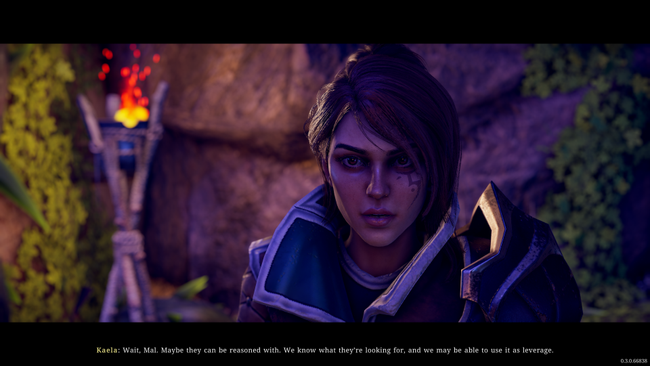
Dark Envoy is a short game that feels drawn out, which usually isn't a good combination. I was able to hit the credits of the game in just over 20 hours, at which point I felt relief more than anything else.
I went into Dark Envoy curious about the title, but I came away apathetic and annoyed. There are some interesting class & skill systems in place, but tedious encounter design, a sluggish narrative, forgettable characters, and a multitude of performance issues, all make this title a difficult RPG to recommend.